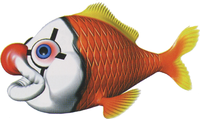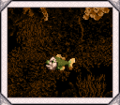Koco: Difference between revisions
TheomanZero (talk | contribs) (GBA Colors) |
No edit summary Tags: Mobile edit Advanced mobile edit |
||
| (82 intermediate revisions by 42 users not shown) | |||
| Line 1: | Line 1: | ||
[[ | {{rewrite-expand|add ''4koma Gag Battle'' information}} | ||
''' | {{species infobox | ||
|image=[[File:Koco DKC3.png|200px|]]<br>Artwork of a red Koco from ''[[Donkey Kong Country 3: Dixie Kong's Double Trouble!]]'' | |||
Kocos first | |first_appearance=''[[Donkey Kong Country 3: Dixie Kong's Double Trouble!]]'' ([[List of games by date#1996|1996]]) | ||
|latest_appearance=''[[Donkey Kong Country 3 (Game Boy Advance)|Donkey Kong Country 3]]'' ([[Game Boy Advance]]) ([[List of games by date#2005|2005]]) | |||
}} | |||
'''Kocos''', also spelled '''Cocos'''<ref>{{cite|date=March 1997|title=''Nintendo Official Magazine'' (UK) Volume 54|page=51}}</ref> and also named '''Kogos''',<ref>{{cite|title=''Nintendo Magazine System'' (Australia) Volume 58|date=January 1998|page=32}}</ref> are fish enemies that first appear in ''[[Donkey Kong Country 3: Dixie Kong's Double Trouble!]]'', where they are one of the most common underwater enemies, said to patrol the nearby waters of [[Donkey Kong Island]].<ref>{{cite|title=''Donkey Kong Land III'' instruction booklet|page=23|publisher=Nintendo of America|date=1997|language=American English}}</ref> They are based on the literal interpretation of a {{wp|clownfish}}, as shown from their face paint and big red nose, and their name likely refers to the classic cartoon character {{wp|Koko the Clown}}. Kocos appear in red and green varieties, with their behavior being determined by their color, comparably to [[Cheep Cheep]]s. Green Kocos are either stationary or move in one direction, while the red ones swim back and forth in an area. In underwater levels, there are also red Kocos that swim nonstop in a single direction. In the [[Game Boy Advance]] remake, their roles were reversed. Like other underwater enemies, Kocos can only be defeated if [[Enguarde the Swordfish|Enguarde]] stabs them. In the level [[Fish Food Frenzy]], [[Dixie Kong|Dixie]] and [[Kiddy Kong|Kiddy]] are required to guide a [[Nibbla]] into eating Kocos to prevent it from becoming angry and biting them. In [[Dixie Kong's Photo Album]], Kocos are classified under the "[[Aquatic Attackers]]" enemy class. | |||
Kocos | Red Kocos appear in ''[[Donkey Kong Land III]]'', retaining the same behavior as before, something that original {{wp|Western world|Western}} releases made evident only from their behavior. Two red Kocos are depicted on the game cover in all regions. Kocos are also the namesake enemy of the level [[Koco Channel]]. | ||
== | ==Profiles and statistics== | ||
* | ===''Donkey Kong Country 3: Dixie Kong's Double Trouble!''=== | ||
*'''Instruction manual:''' ''Colorful clown-fish that patrols the waters on [[Donkey Kong Island|DK Island]].''<ref>{{cite|title=''Donkey Kong Country 3: Dixie Kong's Double Trouble!''|page=19|language=American English|date=1996|publisher=Nintendo of America}}</ref> | |||
== | ==Gallery== | ||
<gallery> | <gallery> | ||
Kocogreen.png|Green Koco from ''Donkey Kong Country 3: Dixie Kong's Double Trouble!'' | |||
Koco DKC3 red.png|''Donkey Kong Country 3: Dixie Kong's Double Trouble!'' sprite (red) | |||
Koco DKC3 green.png|''Donkey Kong Country 3: Dixie Kong's Double Trouble!'' sprite (green) | |||
Koco DKC3 Photo Album.png|A green Koco, as seen in [[Dixie Kong's Photo Album]] | |||
Koco DKLIII sprite.png|''Donkey Kong Land III'' sprite | |||
Koco DKL3c sprite.png|''Donkey Kong GB: Dinky Kong & Dixie Kong'' sprite | |||
DKC3 GBA Koco red.png|''Donkey Kong Country 3'' (GBA) sprite (red) | |||
Koco DKC3 GBA green.png|''Donkey Kong Country 3'' (GBA) sprite (green) | |||
Lurchin Nibbla Koco 4-koma Gag Battle.png|A Koco alongside a [[Lurchin]] and [[Nibbla]] in ''[[4koma Gag Battle]]'' | |||
</gallery> | </gallery> | ||
== Names in | ==Names in other languages== | ||
{{ | {{foreign names | ||
|Jap=ココ | |Jap=ココ | ||
|JapR=Koko | |JapR=Koko | ||
|JapM=Koco | |JapM=Coco | ||
|Ita=Koco | |||
}} | }} | ||
< | |||
==References== | |||
<references/> | |||
{{DKC3}} | {{DKC3}} | ||
{{DKL3}} | {{DKL3}} | ||
[[Category:Fish]] | [[Category:Fish]] | ||
[[Category:Donkey Kong Country 3: Dixie Kong's Double Trouble! enemies]] | |||
[[Category:Donkey Kong Land III enemies]] | |||
[[Category | [[de:Koco]] | ||
[[Category:Donkey Kong Land III]] | |||
Latest revision as of 05:51, August 30, 2024
It has been requested that this article be rewritten and expanded to include more information. Reason: add 4koma Gag Battle information
| Koco | |
|---|---|
 Artwork of a red Koco from Donkey Kong Country 3: Dixie Kong's Double Trouble! | |
| First appearance | Donkey Kong Country 3: Dixie Kong's Double Trouble! (1996) |
| Latest appearance | Donkey Kong Country 3 (Game Boy Advance) (2005) |
Kocos, also spelled Cocos[1] and also named Kogos,[2] are fish enemies that first appear in Donkey Kong Country 3: Dixie Kong's Double Trouble!, where they are one of the most common underwater enemies, said to patrol the nearby waters of Donkey Kong Island.[3] They are based on the literal interpretation of a clownfish, as shown from their face paint and big red nose, and their name likely refers to the classic cartoon character Koko the Clown. Kocos appear in red and green varieties, with their behavior being determined by their color, comparably to Cheep Cheeps. Green Kocos are either stationary or move in one direction, while the red ones swim back and forth in an area. In underwater levels, there are also red Kocos that swim nonstop in a single direction. In the Game Boy Advance remake, their roles were reversed. Like other underwater enemies, Kocos can only be defeated if Enguarde stabs them. In the level Fish Food Frenzy, Dixie and Kiddy are required to guide a Nibbla into eating Kocos to prevent it from becoming angry and biting them. In Dixie Kong's Photo Album, Kocos are classified under the "Aquatic Attackers" enemy class.
Red Kocos appear in Donkey Kong Land III, retaining the same behavior as before, something that original Western releases made evident only from their behavior. Two red Kocos are depicted on the game cover in all regions. Kocos are also the namesake enemy of the level Koco Channel.
Profiles and statistics[edit]
Donkey Kong Country 3: Dixie Kong's Double Trouble![edit]
Gallery[edit]
A green Koco, as seen in Dixie Kong's Photo Album
A Koco alongside a Lurchin and Nibbla in 4koma Gag Battle
Names in other languages[edit]
| Language | Name | Meaning | Notes |
|---|---|---|---|
| Japanese | ココ[?] Koko |
Coco | |
| Italian | Koco[?] | - |
References[edit]
- ^ March 1997. Nintendo Official Magazine (UK) Volume 54. Page 51.
- ^ January 1998. Nintendo Magazine System (Australia) Volume 58. Page 32.
- ^ 1997. Donkey Kong Land III instruction booklet. Nintendo of America (American English). Page 23.
- ^ 1996. Donkey Kong Country 3: Dixie Kong's Double Trouble!. Nintendo of America (American English). Page 19.






